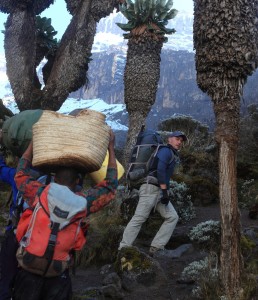Today I’m writing for those of you who identify with Thomas more than Peter. Who peer at the Bible with head cocked, your mouth a line of thoughtfulness. Who tend to uncover more questions than answers in your faith. Whose pain has resulted in a series of unsteady steps backward, confused but holding on.
I’m writing to the strugglers.

It was a conversation in my cubicle more than ten years ago, but my friend’s words remain seared in my mind. I don’t even remember my particular uphill, knotted spiritual frustration at the time. But he replied, “You know, I think God loves strugglers.”
You know, I see it.
I see him beckoning an arboreal Zacchaeus. Conceding to a red-eye rendezvous with Nicodemus. Whispering to Elijah in a cave. I see His answers to His cousin John, questioning his life’s work–maybe even its soon-to-be martyred end–in a dank, infested cell. He sheltered Mary Magdalene’s weathered, raw soul when He might have been winning the approval of piles of Pharisees. He met Hagar in the desert as life evaporated from her, body and soul. He delivered a lone, long-tortured demoniac to liberty at last.
Winding myself even further through the stories of ancient seekers, I’m quietly astonished by God’s responses to strugglers. Questions of calm intention and omnipotence expose God’s compassion for their own most sacredly held wonderings. From an abandoned, pregnant Hagar (“Where have you come from and where are you going?”) to the blind Bartimaeus (“What do you want me to do for you?”) to the disciples (“What are you looking for?” and, “Who do you say that I am?”), God’s gentle, all-seeing, arresting questions reveal a careful knowledge of and nurture for our troubled, confused souls.

My husband has ascended all of Kilimanjaro’s 19,341 feet a total of three times. Though a non-technical climb, it required he be in the best shape of his life. He and his groups proceeded among eight different biozones among all the switchbacks and cliffs, through eight strenuous days (the descent only required one of those). But only recently did I make the association with our breathless, arduous pursuit of intimacy with God, as David writes in Psalm 24: Who shall ascend the hill of the Lord? And who shall stand in his holy place? Author and pastor Tim Keller points out from this Psalm,
To know his presence…is to “ascend” a hill or mountain…and doing so is always a struggle. You must repent, seeking a clear conscience (verse 4). You must know your idols and reject them (verse 4). And you must wrestle in prayer to seek God’s face, as did Jacob (verse 6), who said, “I will not let you go unless you bless me” (Genesis 32: 26). [emphasis added][1]
Perhaps, like my husband’s climb, there is a rigor required of some of us as we traverse the varied terrain of our lives, each trail unfolding more of the greatness of an inscrutable God.
And still, there is satisfaction to be found in the ascent. There remains a level of contentment, even in having not yet fully summited; not yet reaching the fulfillment of our clawing hunger for His fullness, not yet seeing all He sees from His elevation.
I see that God named His own people after that same Jacob of whom Keller speaks, who God renamed Israel: “struggles with God”. I’m still intrigued by Jacob’s all-night grappling and the hip dislocated by God Himself—and still, God honoring this brazen request by granting the blessing.
Even more, I see that “a bruised reed [God] will not break, and a faintly burning wick he will not quench” (Isaiah 42:3). I see that somehow, despite the required strain to “work out my faith with fear and trembling” (Philippians 2:12), He’s still the God hiking up His robes to run toward me, far from hiding or reluctant.
I see that He has always been big enough for all my questions—questions which so often reveal more about me than they do about Him. That as I comb through the tangles in my thoughts, tugging through the snarls, there is peace to be found. That I need not abandon truth until all my questions have been answered.
That all the things I can’t wrap my mind around are simultaneously the reasons He is so much bigger, so other; so worthy of worship.
As Keller writes elsewhere,
All true prayer “pursued far enough, becomes praise.” It may take a long time or a lifetime, but all prayer that engages God and the world as they truly are will eventually end in praise.[1]
Here’s to you, strugglers. And to the God who welcomes you with open arms.
Like this post? You might like
From DesiringGod.com: Will You Wrestle with God?
Yeah, but does God so love individuals (as in, me)?
[1] Keller, Timothy; Keller, Kathy (2015-11-10). The Songs of Jesus: A Year of Daily Devotions in the Psalms (p. 42). Penguin Publishing Group. Kindle Edition.







